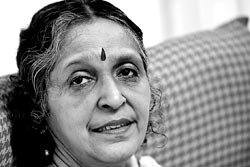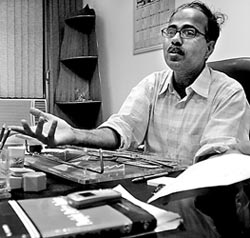
New book gives gruesome account of India girl killingsNEW DELHI, (AFP) - India's unwanted baby girls have been drowned in milk, burned alive in sealed mud pots or fed milk laced with poisonous seeds, but these days it is much easier to kill them in the womb. These are some of the chilling anecdotes in a new book on how a traditional preference for sons in India has resulted in the extermination of generations of females. India has only 927 females for every 1,000 males -- far lower than the worldwide average of 1,050 females -- and last year a report by UNICEF said India continued to lose almost 7,000 girls every day through abortions. The British medical journal The Lancet has put the loss of females at 10 million over the past two decades. "With technology making it easier to find out the gender of a foetus in earlier stages of pregnancy, these numbers will only increase," said journalist Gita Aravamudan, author of "Disappearing Daughters". Aravamudan's new book is trying to give "a face to the issue" -- stories of women forced to endure successive pregnancies to produce male children, and of others forced to have up to four abortions in five years.
"One of the most disturbing revelations came from a midwife who said she had killed hundreds of newborns. She had lost count," the author said in an interview. In India, sons are typically seen as breadwinners. According to Hindu tradition, a son is also supposed to light his parents' funeral pyre. Girls are often viewed as a burden because of the matrimonial dowry demanded by a groom's family. The deep-seated discrimination makes many women more determined to have a boy because they do not want their daughters to suffer the domestic abuse and hardships they faced, the book says."Better to send her straight to heaven rather than make her endure this beating and kicking around," one woman is quoted as telling the author. Others said they had no choice."What do you want from me? What power do you think I have over my womb? None. Do I have the right to decide if I can keep the child if it is a girl? No," said another. The author provides an equally grim account of how the practice has led to a cycle of abuse. In some regions, an acute shortage of women has resulted in men buying brides and sharing them with their brothers. The book tells of Tripala Kumari, 18, whose husband killed her because she refused to have sex with his brothers. Instances came to light of male foetuses dumped in dustbins by doctors who aborted them to make money after lying to parents that the child was a girl."Female infanticide is akin to serial killing. But female foeticide was more like a Holocaust. A whole gender is getting exterminated. It is a silent and smoothly executed crime which leaves no waves in its wake," Aravamudan writes.
The author said it was not an easy subject to tackle."Some of the communities had very militant people. There was a lot of hostility. They thought an outsider like me didn't have any right to question what for them is an accepted thing," Aravamudan said. "There was total secrecy, a blank wall. I needed a lot of patience, you can't just go to someone and ask 'did you kill your girl?'," she said of the research which took her a year. The solutions, Aravamudan said, are not easy. In 1994, India introduced tough laws against tests to determine foetal gender for non-medical reasons, but rules are widely flouted by doctors in what activists say is a multi-million-dollar business. The tests are done secretly and are often hard to prove. Doctors are widely viewed as pillars of the community, and authorities took 12 years to get their first conviction. "Our laws against dowry and foeticide are excellent, but only on paper,"the writer said. In a gruesome discovery last month, dozens of tiny bones were found in the septic tank of a clinic belonging to a man posing as a doctor in Gurgaon, a wealthy suburb of the Indian capital. The suburb is part of a state with one of the country's worst gender ratios -- just 820 females for every 1,000 males -- showing the preference for sons is deeply rooted even among families with high income and education levels. The government continues to grapple for ideas, and this month announced plans to register all pregnancies. According to India's minister for women and child development Renuka Chowdhury, the data would permit authorities to focus efforts on areas with a large gap between the number of pregnancies recorded and births. The government has in the past announced plans to encourage people to abandon their daughters in government facilities rather than kill them. But the successive plans have come under fire from critics who say it is not only intrusive but also bureaucratically impossible to keep an eye on all pregnancies in a country of 1.1 billion people. Encouraging people to abandon their babies was a "ludicrous" idea, Aravamudan said, because it would encourage a belief that girls were unwanted."And most girls are killed before, and not after, they are born." |
|| Front
Page | News | Editorial | Columns | Sports | Plus | Financial
Times | International | Mirror | TV
Times | Funday
Times || |
| |
Copyright
2007 Wijeya
Newspapers Ltd.Colombo. Sri Lanka. |

